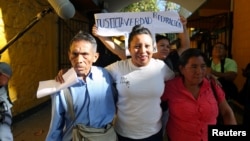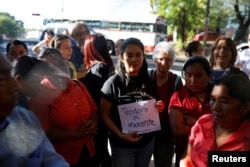When Salvadoran Teodora Vasquez was freed this month after more than a decade in prison for a murder she says she did not commit, her thoughts turned to being reunited with her son and to helping other women behind bars.
Vasquez was sentenced to 30 years in 2008 for aggravated murder after being convicted of inducing an abortion, which is a crime under any circumstances in El Salvador.
Vasquez said she went into labor in a bathroom at work in 2007, and that the baby was stillborn. Prosecutors said she had strangled the baby after birth.
Earlier this month, Vasquez walked out of the overcrowded Ilopango women's prison in the capital San Salvador, greeted by her family and crowds of cheering activists, after the Supreme Court reduced her sentence.
"I think that these 10 years and seven months [in jail] have marked my life forever, because I won't ever forget it," Vasquez told the Thomson Reuters Foundation.
"The day before gaining my freedom, it was the most exciting and contradictory [thing] at the same time. I had mixed feelings because ... I was so eager to get out, but at the same time I thought about my cellmates."
For Vasquez, freedom means spending time with her 14-year-old son. She wants him to get a good education and a job, while she aims to study further and become a lawyer. She also hopes one day to go to the beach.
"For now, I'm enjoying being with my son. We go out, not far, just around the corner from my home because I'm afraid of going far in case I get lost," the 34-year-old said.
"My son hugs me. He tells me: 'I've waited for you for so long over the years.’"
Freedom for others?
Vasquez's release puts the spotlight on El Salvador's total ban on abortion as the Central American nation faces mounting international pressure to overturn its strict law.
Abortion has been outlawed in the Catholic-majority nation since 1997 even in cases of rape, incest, when the woman's life is in danger or the fetus is deformed. Five other countries in Latin America and the Caribbean also have an outright ban.
In 2016, the country's ruling party introduced a bill to allow abortion in cases of rape or a risky pregnancy, but no date has been set for a vote, and it will likely face tough opposition from the Catholic Church and evangelical groups.
In November, the United Nations urged El Salvador to issue a moratorium on applying its abortion law, and asked authorities to review all such cases in which women had been jailed.
27 women still behind bars
According to the local Citizen Group for the Decriminalization of Abortion (CFDA), which helped campaign for Vasquez's release, another 27 women are in prison under the country's abortion law.
The CFDA said they had been accused of inducing abortions, then wrongfully convicted and jailed for murder, when instead they had suffered miscarriages, stillbirths or pregnancy complications.
"It's totally clear that they haven't committed any crime, but that they suffered an obstetric emergency which led to the loss of their child and that took them from the hospital to jail," said CFDA spokesman Jorge Menjivar.
"We will continue to seek different avenues until these women can regain their freedom."
He said the CFDA had campaigned successfully for the early release of 16 women imprisoned for abortion-related crimes since 2009. Some had their sentences quashed after appeal or were freed after being pardoned.
Vasquez said she would fight for the release of other women jailed for abortion crimes. Like her, most were young, poor single mothers with little education when convicted.
"For them, my leaving prison was an engine that was ignited.
They are hopeful that I will fight on their behalf.... They know I'm going to help them, be with them and for them," she said.






